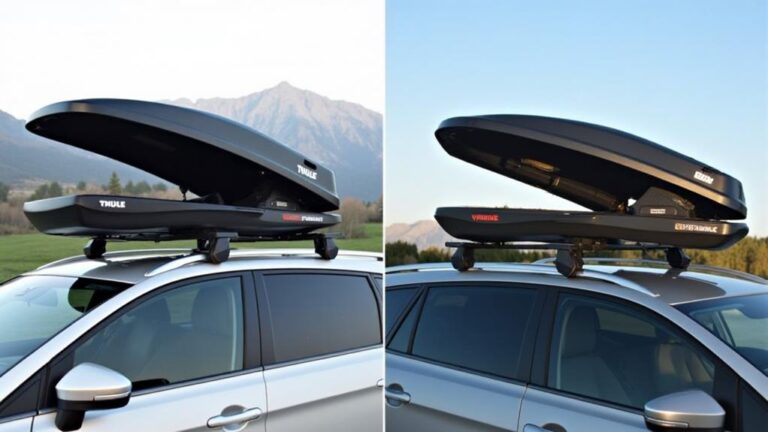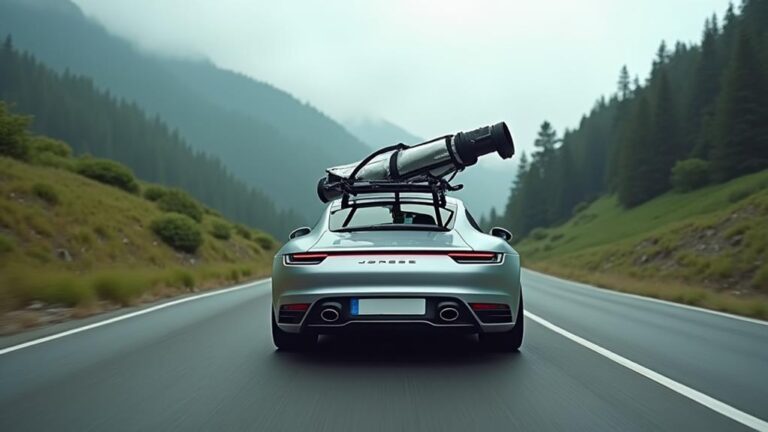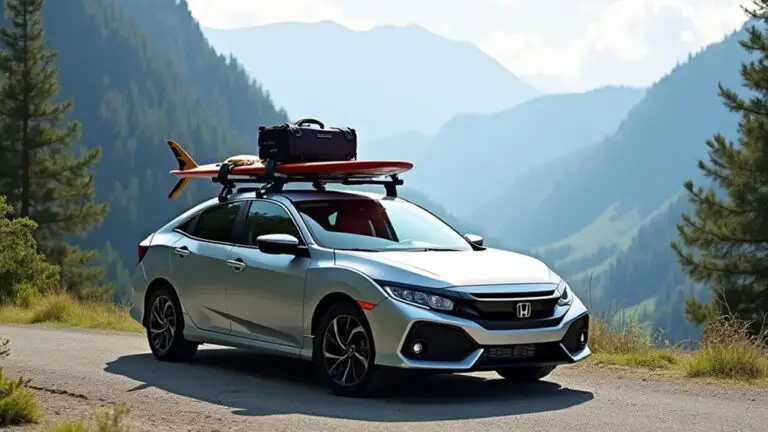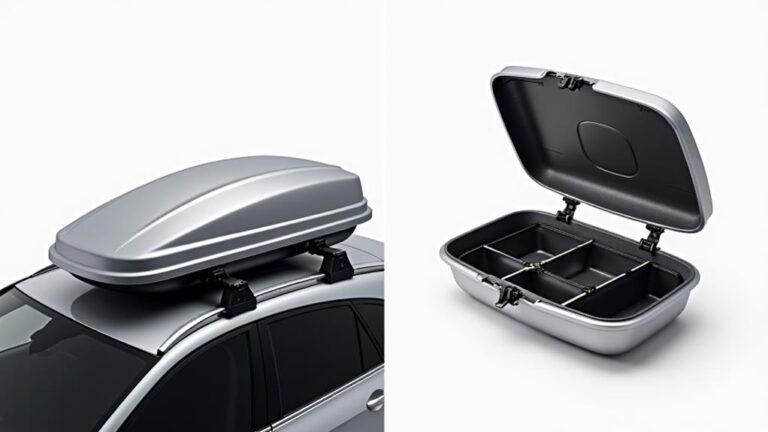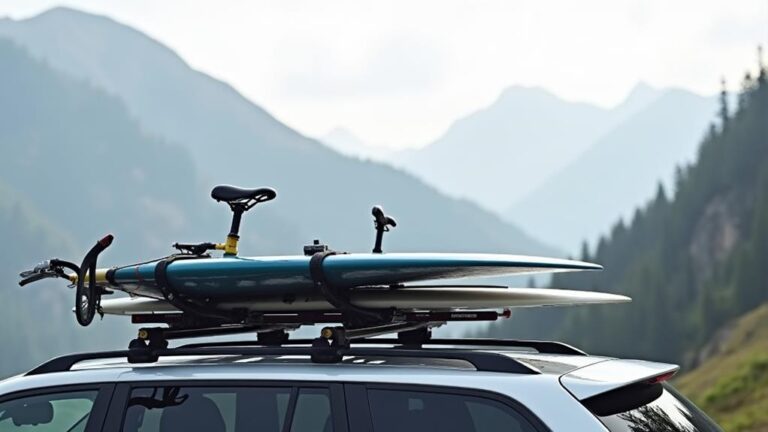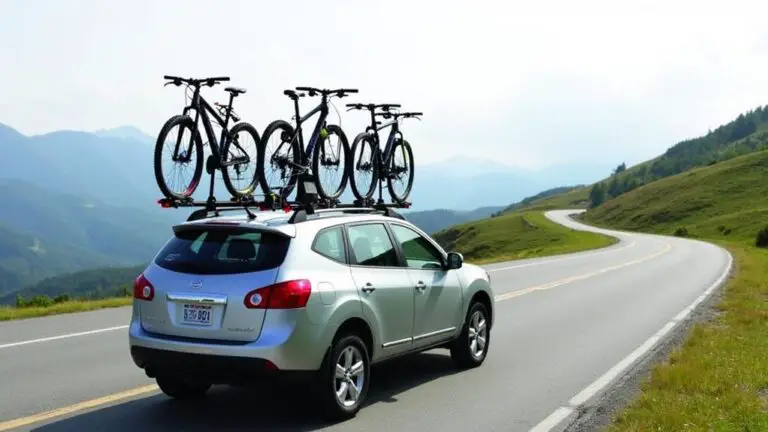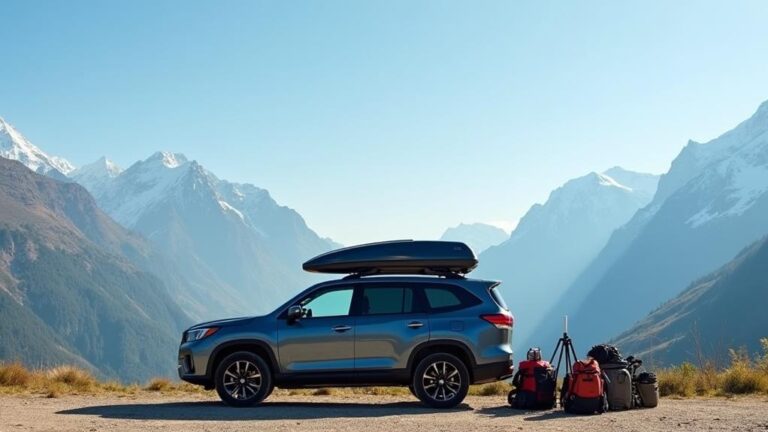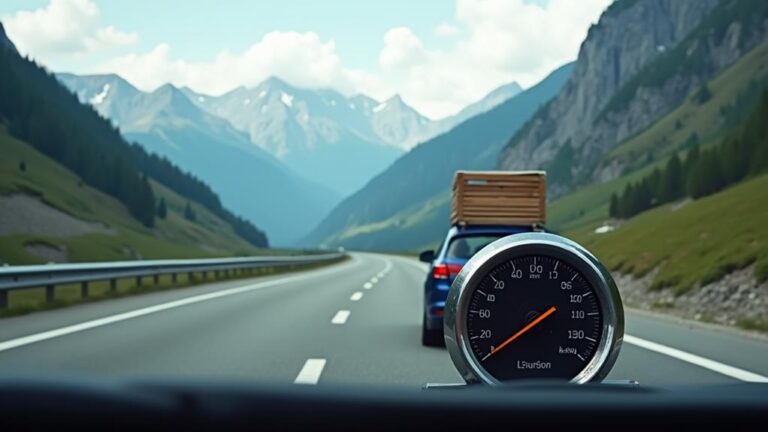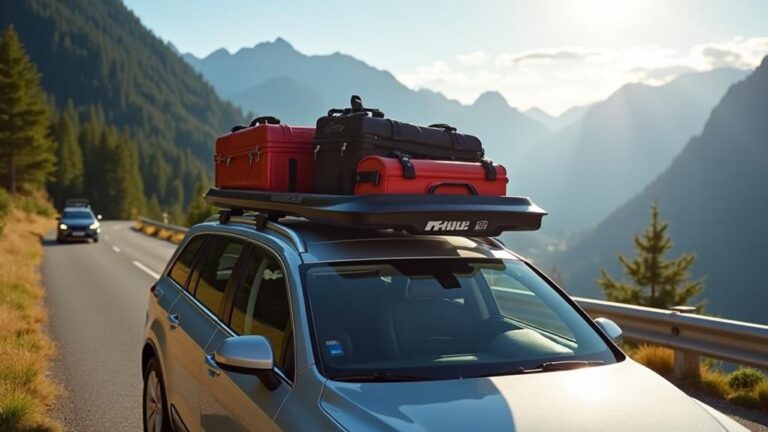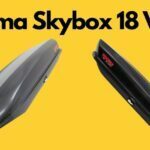Your outdoor adventures are just a trunk space away – but only if you've got the right cargo box on your vehicle. Choosing between Thule and Yakima, two of the top brands in the market, can be a formidable task. Both Thule and Yakima offer high-quality cargo boxes with distinct features, but what sets them apart? Thule's patented PowerClick system and proprietary materials seem to give it an edge, but at a higher price point. As you weigh your options, you're left wondering: will the extra cost of Thule's premium features be worth it for your next road trip?
Key Takeaways
- Thule and Yakima cargo boxes differ in material selection, with Thule using polyurethane-coated ABS plastic and Yakima using a slightly different ABS formulation.
- Thule's cargo boxes feature a patented PowerClick mounting system, while Yakima's utilize a Carbonite construction and cam-action clamping mechanism.
- Load capacity and weight limits vary between Thule and Yakima cargo boxes, with Thule's Force XT XL having a 165-lb load capacity.
- Thule's cargo boxes tend to be more expensive, starting at around $400, while Yakima's start at around $300 but may require more frequent replacement.
- Both brands offer robust security features, including latch systems and locking mechanisms, but Thule's One-Key System and Yakima's SKS system differ in design.
Design and Construction Quality
When evaluating the design and construction quality of Thule and Yakima cargo boxes, you're likely looking for a rugged and durable solution that can withstand various weather conditions and heavy use.
Both brands focus on frame durability, using high-strength materials and advanced manufacturing techniques to create robust frames that can support heavy loads.
Thule's cargo boxes feature a patented PowerClick mounting system, which provides a secure and stable connection to your vehicle's roof rack.
Yakima's cargo boxes, on the other hand, utilize the SkyBox series' Carbonite construction, which combines a lightweight yet incredibly strong polymer with a durable ABS plastic shell.
Material selection is also vital in determining the overall quality of the cargo box.
Thule uses a proprietary polyurethane-coated ABS plastic that provides excellent impact resistance and UV protection.
Yakima's cargo boxes are made with a similar ABS plastic material, but with a slightly different formulation that prioritizes flexibility and durability.
Both materials are designed to withstand harsh weather conditions and heavy use, making them suitable for outdoor enthusiasts and frequent travelers.
Cargo Box Capacity Options
When choosing between Thule and Yakima cargo boxes, you'll need to weigh the capacity options that best fit your needs.
If you're looking for large cargo capacity, both brands offer models with ample space for bulky items. However, if compact storage is a priority, you'll want to explore the smaller cargo box options that Thule and Yakima also provide.
Large Cargo Capacity
A key consideration for outdoor enthusiasts and frequent travelers is finding a cargo box that can accommodate their gear.
When it comes to large cargo capacity, both Thule and Yakima offer a range of options to suit your needs. You'll want to ponder the maximum loads you plan to carry, as well as any cargo constraints that may impact your selection.
Thule's largest cargo boxes, such as the Vector M and the Force XT, offer capacities of up to 22 cubic feet.
These boxes are ideal for carrying bulky items like skis, snowboards, and luggage.
Yakima's largest cargo boxes, including the SkyBox 21 and the RoadTrip, also offer capacities of up to 21 cubic feet.
When choosing a large cargo box, ponder the weight and size of the gear you plan to carry, as well as the weight capacity of your vehicle's roof rack.
Be sure to check the manufacturer's specifications to verify the cargo box you choose can handle your maximum loads.
Compact Storage Options
Not everyone needs massive cargo boxes, and that's where compact storage options come in.
If you're an urban dweller, you know that parking constraints can be a major issue. Thule and Yakima offer compact cargo boxes that cater to your needs.
Thule's Force XT series has a compact option with a 11-cubic-foot capacity, ideal for small SUVs or sedans. Yakima's SkyBox Carbons also offer a compact option with a 12-cubic-foot capacity, designed for smaller vehicles.
When choosing a compact cargo box, consider the size of your vehicle and the type of gear you need to transport.
Both Thule and Yakima offer sleek designs that won't obstruct your view or create wind noise. The compact cargo boxes are also more fuel-efficient and easier to install.
Thule's click-and-clack system and Yakima's SKS locking system guarantee a secure fit on your vehicle.
Weighing your options, you'll find that compact storage options from Thule and Yakima provide the perfect solution for urban adventurers with limited space.
Both brands offer high-quality, durable, and functional compact cargo boxes that meet your needs.
Ease of Installation Process
| Feature | Thule | Yakima |
|---|---|---|
| Tool-free Mounting | Yes, with Thule's SpeedLink system | Yes, with Yakima's SKS (Same Key System) |
| Hitch Compatibility | Compatible with most 2-inch hitches | Compatible with most 2-inch and 1.25-inch hitches |
| Installation Time | Approximately 10-15 minutes | Approximately 15-20 minutes |
| Mounting Options | Offers a range of mounting options, including roof racks and hitch mounts | Offers a range of mounting options, including roof racks and hitch mounts |
| Clamping Mechanism | Uses a torque-limiting clamping mechanism for secure attachment | Uses a cam-action clamping mechanism for secure attachment |
When installing your cargo box, verify you follow the manufacturer's instructions and take necessary safety precautions. Proper installation will help prevent damage to your vehicle and guarantee a secure, rattle-free ride.
Durability and Weather Resistance
When evaluating the Thule and Yakima cargo boxes, you'll want to weigh their material build quality and how it impacts their overall durability.
Thule's cargo boxes are made from a combination of ABS plastic and metal, while Yakima's boxes are constructed from a mix of ABS plastic, metal, and fiberglass.
You'll also need to examine their water resistance features, such as seals and gaskets, to determine which one provides better protection for your gear.
Material Build Quality
Comparing Thule and Yakima cargo boxes, you'll find that each has its unique material build quality, reflecting their respective emphasis on durability and weather resistance. Material thickness is a critical factor in determining the strength and longevity of a cargo box. Thule cargo boxes typically feature a thicker material build quality, with some models boasting up to 25% thicker walls than Yakima's offerings.
Frame rigidity is another essential aspect of material build quality. A sturdy frame can withstand harsh weather conditions and heavy loads, guaranteeing the cargo box remains secure on your vehicle.
| Cargo Box | Material Thickness | Frame Rigidity |
|---|---|---|
| Thule Vector | Up to 1.5 mm | Reinforced with steel beams |
| Yakima SkyBox | Up to 1.2 mm | Fiberglass-reinforced plastic |
| Thule Force | Up to 1.8 mm | Heavy-duty ABS plastic |
When choosing between Thule and Yakima cargo boxes, consider the material build quality and its impact on durability and weather resistance. A thicker, more rigid material build quality can provide peace of mind and guarantee your cargo box withstands the elements.
Water Resistance Features
Thule and Yakima cargo boxes both feature water resistance features designed to protect your gear from the elements.
When evaluating these features, you'll want to weigh the materials and construction methods used to keep water out.
Both Thule and Yakima employ seam sealing to guarantee a watertight seal between the cargo box's lid and base. This involves applying a waterproof sealant to the seams, preventing water from seeping in.
Additionally, both brands use a combination of materials, such as ABS plastic and EPDM rubber, to create a durable and water-resistant lid seal.
Drainage channels are another key feature in both Thule and Yakima cargo boxes, designed to direct water away from the cargo area.
These channels, often located on the cargo box's floor or sides, help to prevent water from accumulating and potentially seeping into the cargo area.
By evaluating the water resistance features of Thule and Yakima cargo boxes, you can determine which one best meets your needs for protecting your gear in various weather conditions.
Look for features like seamless construction, waterproof seals, and effective drainage systems to verify your gear stays dry.
Security Features Comparison
Within the domain of cargo box security, you'll find both Thule and Yakima employing robust features to safeguard your gear.
Latch systems and locking mechanisms are two essential components of their security features. Thule's cargo boxes feature the proprietary One-Key System, which utilizes a single key to lock and release the entire system. This system provides a convenient and secure way to manage your gear.
Yakima's cargo boxes, on the other hand, employ the SKS (Same Key System) locking mechanism, allowing you to use a single key for all your Yakima products.
Both Thule and Yakima offer reinforced latch systems that provide additional security. Thule's latches are designed with a reinforced steel rod that guarantees a secure closure, while Yakima's latches feature a robust cam-lock design.
These features work in conjunction with the locking mechanisms to provide a secure and tamper-proof closure. By incorporating these security features, both Thule and Yakima cargo boxes offer a high level of protection for your gear, giving you peace of mind while on the go. This attention to security detail sets both brands apart in the cargo box market.
Price Points and Value Analysis
When evaluating the overall value of a cargo box, price plays a pivotal role.
You'll want to ponder not only the initial cost but also the long-term cost effectiveness of the product.
Both Thule and Yakima offer high-quality cargo boxes, but their price points differ substantially.
If you're looking for budget friendliness, Yakima's cargo boxes tend to be more affordable, with prices starting at around $300.
Thule's cargo boxes, on the other hand, typically start at around $400.
However, Thule's products are often praised for their durability and longevity, which can make them a more cost-effective option in the long run.
- Ponder the following factors when evaluating the price points of Thule and Yakima cargo boxes:
- Initial purchase price
- Durability and lifespan of the product
- Warranty and customer support offered by the manufacturer
Ultimately, the best value will depend on your specific needs and budget.
Be sure to weigh the pros and cons of each option carefully before making a decision.
Load Capacity and Weight Limits
Considering your cargo box's price point is just the starting point; you also need to evaluate its load capacity and weight limits to guarantee it meets your specific needs. This is particularly vital if you plan on carrying heavy or bulky items. Load rating considerations should be at the top of your list when choosing between Thule and Yakima cargo boxes.
| Cargo Box Model | Load Capacity (lbs) |
|---|---|
| Thule Force XT XL | 165 |
| Yakima SkyBox Carbonite 21 | 210 |
| Thule Motion XT XL | 165 |
| Yakima SkyBox 16 | 180 |
| Thule Vector M | 220 |
When evaluating load capacity, don't forget to ponder weight distribution importance. Unevenly distributed weight can put excessive stress on the cargo box and roof rack, leading to damage or failure. Verify that the cargo box you choose has a weight capacity that matches your needs and that you distribute the weight evenly across the box. By doing so, you'll be able to safely transport your gear without worrying about the structural integrity of your cargo box.
Compatibility and Vehicle Fit
Harmony between your cargo box and vehicle is crucial for safe and trouble-free transportation.
Both Thule and Yakima offer a range of cargo boxes that cater to various vehicle profiles, guaranteeing a secure fit.
When choosing a cargo box, paramount is to weigh the dimensions of your vehicle's roof, as well as the type of roof rack or hitch system you have installed.
To verify compatibility, Thule and Yakima provide online fit guides that help you determine the best cargo box for your vehicle.
These guides take into account the vehicle's make, model, and year, as well as the roof rack or hitch system.
Some key factors to weigh when evaluating compatibility include:
- Roof rack compatibility: Check if the cargo box is compatible with your roof rack system, including the type of crossbars and mounting hardware.
- Hitch adaptors: If you plan to use a hitch-mounted cargo box, verify that the box is compatible with your vehicle's hitch system and that you have the necessary adaptors.
- Vehicle-specific fit kits: Some cargo boxes require vehicle-specific fit kits, which provide a tailored fit for your vehicle's roof or hitch system.
Warranty and Customer Support
Once you've found a cargo box that fits your vehicle, it's time to think about the manufacturer's warranty and customer support.
Both Thule and Yakima offer extensive warranties for their cargo boxes, but they differ with regard to coverage and duration. Thule's warranty covers defects in materials and workmanship for a minimum of 2 years, while Yakima's warranty covers the same for 5 years.
When it comes to making a claim, Thule's claims process involves contacting their customer service department directly, providing proof of purchase and a detailed description of the issue.
Yakima, on the other hand, allows you to initiate the claims process online, making it a more convenient option. Both manufacturers offer multiple support channels, including phone, email, and online chat, to help you resolve any issues with your cargo box.
It's vital to review the warranty terms and conditions for both Thule and Yakima to determine which one offers the best protection for your investment.
Additionally, consider the level of customer support each manufacturer provides to guarantee you can get help when you need it.
Frequently Asked Questions
Can Thule or Yakima Cargo Boxes Be Used for Motorcycles?
You can use Thule or Yakima cargo boxes for motorcycles with the right adapters and attachments. Motorcycle adapters and bike attachment systems allow you to secure bikes, but compatibility and weight limits must be checked first.
How Often Should Cargo Box Seals Be Replaced or Maintained?
You should inspect cargo box seals every 3-6 months, and after exposure to harsh weather conditions. Perform weather testing by applying water pressure to detect leaks, and replace seals when damage or wear is evident, ensuring peak performance.
Are Thule and Yakima Cargo Boxes Compatible With Roof Racks?
You can install Thule or Yakima cargo boxes on various roof racks, but compatibility depends on crossbar sizes and shapes. Roof rack adapters may be required for certain models to guarantee a secure, damage-free fit.
Can Cargo Boxes Be Installed Without a Roof Rack System?
You can install cargo boxes without a roof rack system by opting for a soft install, which mounts directly to your vehicle's roof, but verify you have sufficient rooftop clearance to avoid damage or obstruction.
Are Thule and Yakima Cargo Boxes Suitable for Off-Road Driving?
Picture yourself traversing rugged terrain – will your cargo box keep up? In general, you'll find cargo boxes from reputable brands are designed for off-road capability, with Thule and Yakima models being no exception, built to withstand rough roads.
Conclusion
You may think that the higher price of Thule's cargo boxes is a deal-breaker, but consider the long-term benefits. While they may cost more upfront, their superior durability and longevity make them a worthwhile investment. You'll be using your cargo box for years to come, and Thule's high-quality construction will withstand the elements and heavy use. By choosing Thule, you're not just buying a cargo box – you're buying peace of mind.
